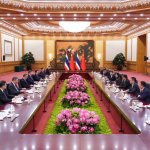
The decision by ASEAN leaders and the Biden Administration to put out an empty chair to represent the ousted civilian-led government during last week’s U.S.-ASEAN Summit was conspicuous. While the Americans suggested that the topic of the Myanmar crisis—which as gone unabated for more than 15 months—would be a “subject of intense deliberation” throughout the course of the conference, it also stood as a symbol of American and ASEAN inability to drive home a political and diplomatic solution.
Given the complexity of issues facing ASEAN leaders, given American preoccupation with a rising and aggressive China, and the intricacies of regional trade, Myanmar was still an urgent topic, with the U.S. and a few ASEAN leaders instead choosing to meet with National Unity Government (NUG) Foreign Minister Zin Mar Aung.
However, the decision to set out an empty chair reeks of ASEAN’s inability to form consensus. Biden’s decision to place the vacant chair is emblematic of this.
Formally recognizing the NUG in the Summit’s proceedings would have suggested to the junta that diplomatic action would proceed without their involvement, despite the fact that the junta leader, General Min Aung Hlaing, was barred from the summit. Some diplomatic efforts have already soured, evidenced by the junta’s recent banning of Noleen Heyzer, the UN Special Envoy for Myanmar from attending a meeting on humanitarian coordination and assistance. Heyzer herself received a scolding from Myanmar’s civil society earlier in the year when she suggested a power-sharing agreement that included the junta.

ASEAN states have been rather divided on the recognition of the NUG or the National Unity Consultative Council (NUCC), a collection of various stakeholders, including its parallel government. Both are recognized by the junta as terrorist groups. Early on, the NUG was not extended an invitation to a special summit held in Jakarta in April 2021. Malaysian Foreign Minister Saifuddin Abdullah welcomed the idea of working with both groups and suggested that the ASEAN Special Envoy, Prak Sokhonn welcomed the idea. However, the NUG Foreign Minister recently criticized the attitude of the ASEAN Chair, Cambodia, for being too biased toward Myanmar’s military junta. Cambodian Prime Minister Hun Sen earlier engaged in a kind of “cowboy diplomacy” by departing with conventional and agreed upon measures to contain the crisis and visiting Myanmar. Thailand has shown no willingness to play a proactive role and earlier, the Royal Thai Police were considered under orders last year to arrest members of the NUG suspected of staying in Thailand.
The United States has been disappointed with the steps taken by ASEAN to resolve the crisis and had hoped that the Summit would boost momentum going forward, although the Joint Vision Statement from May 13, a tepid document with uninspired language suggests otherwise. The Biden Administration had considered inviting a “non-political representative” to the Summit, but that was quickly dismissed. The problem for the Biden Administration concerning Myanmar is that the U.S.-ASEAN Summit did not prioritize action on Myanmar. American inattention to the regional crisis is reflected in its prioritization of gaining some agreement on Russia’s invasion of Ukraine, attempts to redirect ASEAN state foci from Beijing to Washington, and a plethora of trade discussions, including the lukewarm introduction of a regional economic framework. The empty chair gesture was by nature empty without a greater emphasis on Myanmar as a political priority.
The Summit should have been an opportunity for the Americans to place greater attention on Myanmar, who because of Ukraine has been given a layer of cover since February 24 to avoid the kind of international attention its human rights atrocities would otherwise attract. Banning junta leader Gen. Hlaing, was a clear signal that the United States will not engage with the junta on any level, particularly after it has shown no interest in addressing the Five-Point Consensus, evidenced by its dismissal of it as a “suggestion” and barring the chosen Special Envoy, from Brunei from entering the country. It was only on Friday that Biden announced the nomination of Yohannes Abraham, currently the Chief of Staff and Executive Secretary at the National Security Council to serve as U.S. Ambassador to ASEAN. The post has been vacant for the past five years.

However, the lack of American engagement also sends mixed signals to ASEAN, that a political solution that includes the junta would not be legitimized and that the extremely difficult post-settlement task of restoring deep political divisions within the country would be borne primarily by ASEAN member states. The United States has been hands off in terms of its willingness to aid the opposition, including the prospect of a no-fly zone, the prohibition of arms sales, or the facilitation of arms and training to armed groups or EAOs. These measures could further inflame tensions with China and could further elongate a dubious American record, evidenced by earlier outcomes in Afghanistan and Syria.
It is no wonder, therefore, that the major outcome of the Summit is a measly pledge of $150 million by the U.S. to ASEAN for infrastructure, security, and pandemic response, a figure dwarfed by China’s $1.5 billion pledge over three years announced last November. That empty chair could have just as easily symbolized American inattention to the region.






